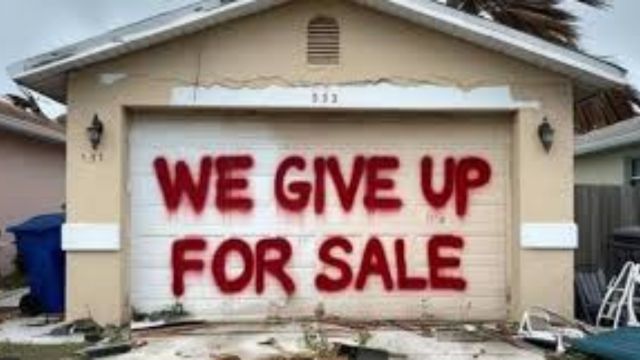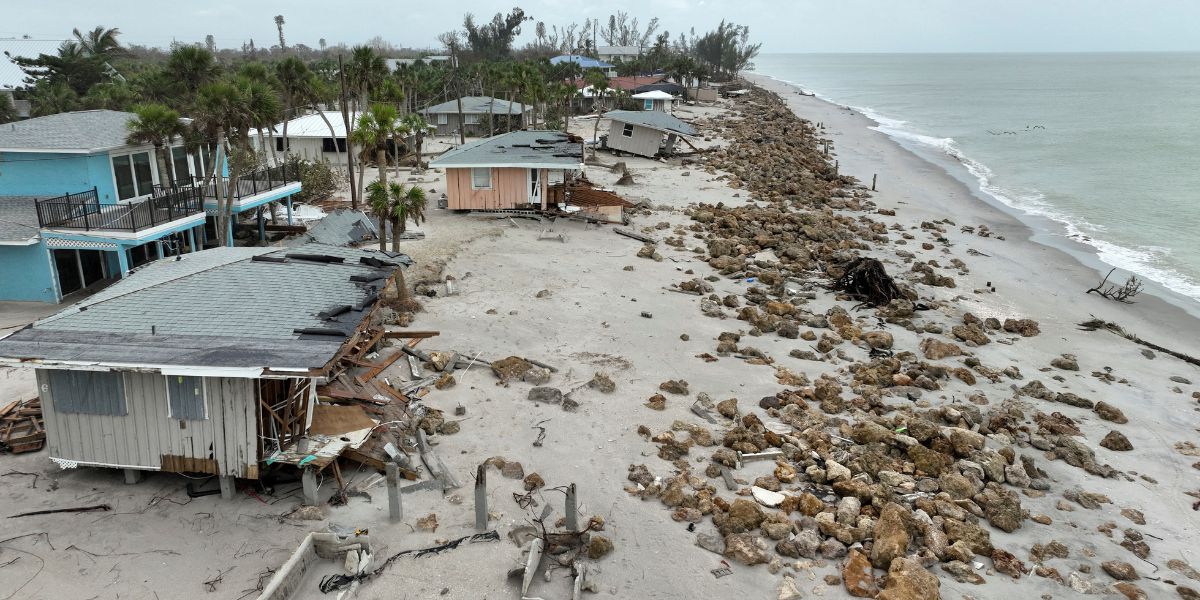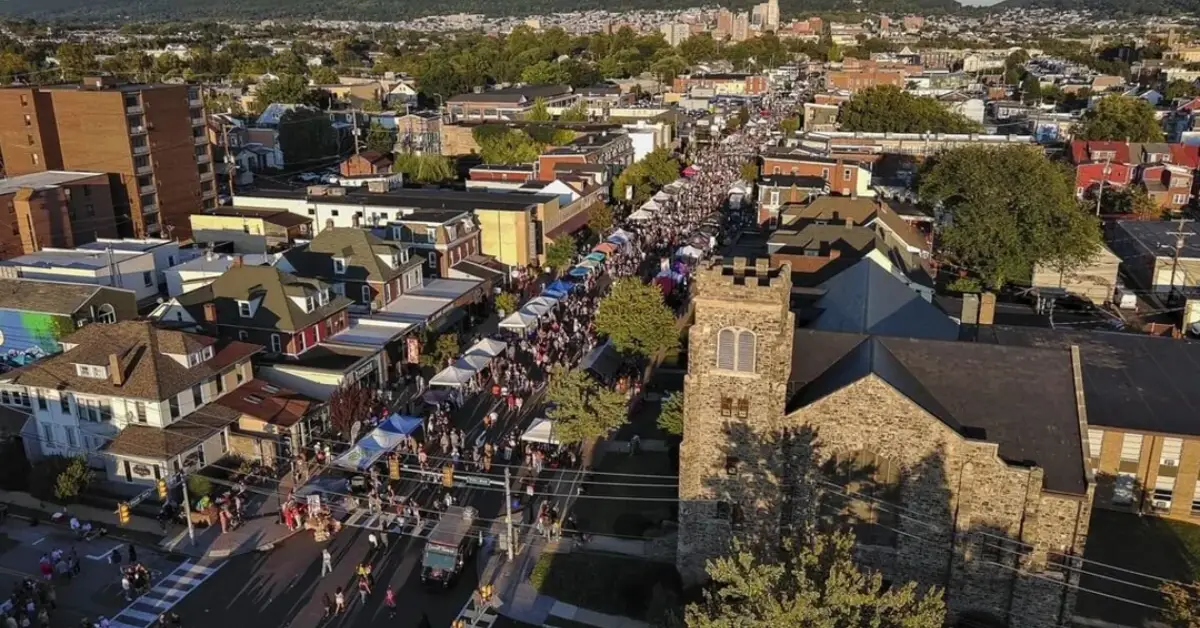MJP –
Desperate homeowners, crushed by soaring insurance costs and storm damage, sell to cash buyers at steep discounts while experts warn of long-term economic implications and the loss of the American dream of owning a home
Fort Lauderdale, FL – Florida’s residents are facing a new reality in the wake of devastating hurricanes. As the state struggles with a relentless storm season and skyrocketing insurance costs, many homeowners are making the heartbreaking decision to sell their damaged properties to “quick-buy” “as is” investors.
In the wake of recent hurricanes Helene and Milton, Florida, homeowners are increasingly selling their hurricane-damaged homes to “quick buy” investors. These homeowners, often underinsured or without insurance due to the prohibitive costs, are opting out of Florida to cut their losses and move out of the state. This trend is not only reshaping the real estate market but also has far-reaching implications for Florida’s economy and the homeowners themselves.
According to the Insurance Information Institute, an estimated 15% to 20% of Florida homeowners are forgoing coverage due to the high costs. This translates to hundreds of thousands of homes vulnerable to storm damage without adequate financial protection.
Statistics and Data
- Hurricane-Damaged Homes: According to the Florida Office of Insurance Regulation, over 22% of homes damaged by Hurricane Ian lacked insurance or were underinsured.
- Insurance Costs: According to the NAIC, the average annual homeowners’ insurance premium in Florida has increased by 25% since 2020.
- Quick Buy Companies: A real estate data firm ATTOM Data Solutions report found that “quick buy” companies accounted for 10% of all home sales in Florida in the third quarter of 2022.
The Rise of “Quick Buy” Companies
“Quick buy” companies, also known as “opportunity investors,” have been capitalizing on the desperation of homeowners struggling to recover or can’t recover from hurricane damage. These companies offer fast cash for damaged properties at significantly lower prices than their pre-hurricane value.
One such company, We Buy Houses, has seen a surge in business since Hurricane Ian. “We’ve had a significant increase in inquiries from homeowners looking to sell their damaged properties quickly,” said a company spokesperson.

Desperate to recoup some value from their damaged properties, many homeowners are turning to “quick-buy” investors who offer cash offers for homes in any condition. These investors, often referred to as “vultures,” capitalize on the misfortune of homeowners facing financial ruin.
The Insurance Crisis
Florida’s insurance market has been in turmoil for years, with premiums skyrocketing due to frequent and severe hurricanes. According to the Florida Office of Insurance Regulation (FLOIR), the state has seen a significant number of claims closed without payment. For instance, out of 58,834 claims related to Hurricane Helene, 23,942 were closed without payment. Similarly, Hurricane Milton saw 215,051 claims, with 27,736 closed without payment. These figures highlight the extent of underinsurance and the financial strain on homeowners.
The Rise of “Quick Buy” Investors
With insurance costs becoming untenable, many homeowners are turning to “quick buy” investors who purchase properties “as is” for cash. These investors, often referred to as vultures, capitalize on the desperation of homeowners looking to escape the cycle of damage and repair. Homeowners like Carla Wellnik from St. Petersburg, who has seen her home flood three times in two years, are selling their properties at a loss just to move on.
Economic Impact on Florida
Florida Gulf Coast Struggles With Hurricane’s Impact on Turtle Nesting Sites
The exodus of homeowners selling their properties has significant economic repercussions for Florida. The real estate market is seeing an influx of damaged properties being sold at reduced prices, which can devalue surrounding homes and neighborhoods.
Additionally, the loss of residents can lead to decreased consumer spending and a shrinking tax base, further straining small-town local economies.
The Florida Chamber of Commerce estimates that the ongoing insurance crisis could reduce state GDP by 2.5% by 2025. Economists warn that when longtime residents sell at a loss and leave the state, they take their spending power and tax contributions with them. This creates a downward economic spiral in affected communities.
Real Estate Impact
The Florida Realtors Association reports that “as-is” cash purchases have increased by 127% in hurricane-affected regions since 2022. One “As Is” company president confirms this trend: “Our company alone has purchased over 200 storm-damaged properties in the past 18 months. Most sellers are simply walking away from their American dream.”
Repercussions for Homeowners
For the homeowners who sell their properties, the decision is often a last resort. Many face financial losses as they sell their homes for less than they paid or invested in repairs. Moreover, the process of selling a home in Florida comes with its own set of taxes and fees, including capital gains tax, documentary stamp tax, and property taxes. These additional costs can further erode any financial gains from the sale.
The trend of homeowners selling to “quick buy” companies has severe repercussions for both the individuals involved and the state’s economy.
- Financial Losses: Homeowners who sell to “quick buy” companies often receive significantly less than their property’s pre-hurricane value, leaving them with substantial financial losses.
- Displacement: Many homeowners are forced to relocate, leading to a loss of community and social connections.
- Economic Instability: The influx of “quick buy” companies can destabilize local real estate markets, causing property values to decline and making it challenging for remaining homeowners to sell their properties.
- Tax Base Erosion: As homeowners flee, local governments face a decline in property tax revenue, potentially impacting public services and infrastructure.
The consequences for homeowners who are forced to flee their damaged properties can be devastating. Many are being forced to relocate to other parts of the state, out of state, or even becoming homeless, leaving behind their communities, jobs, and support networks.
Forward Together
The trend of Florida homeowners selling their hurricane-damaged, underinsured homes to “quick buy” investors is a symptom of a larger insurance crisis. As more residents are priced out of the insurance market, the state’s economic and social fabric is at risk. Addressing this issue requires comprehensive reforms in the insurance industry and support for homeowners to ensure they are adequately protected against future disasters.
The trend of homeowners selling their hurricane-damaged properties is likely to continue as climate change exacerbates the frequency and intensity of storms in the region. Unless significant reforms are implemented to address the insurance crisis, Florida could face a mass exodus of residents and a significant decline in its economy.




